John Kerry’s Comments On Israel-Palestine Encapsulate U.S. Foreign Policy

Rare is the moment when an unscripted comment from a secretary of state symbolizes all that’s wrong with America’s foreign policy, but it appeared the other day in the context of Israeli-Palestinian peace talks.
Asked at the Munich Security Conference about prospects for peace, John Kerry expressed hope and discussed the implications of failure, focusing far more on the burden for Israel than the Palestinian Authority: “For Israel, the stakes are also enormously high,” Kerry said. “Do they want a failure that then begs whatever may come in the form of a response from disappointed Palestinians and the Arab community?”
Moments later, he added, “I believe that – and you see for Israel there’s an increasing de-legitimization campaign that has been building up. People are very sensitive to it. There are talk of boycotts and other kinds of things. Are we all going to be better with all of that?”
Well, there it is – all the ally-bashing, victim-blaming, and double standard-setting of U.S. foreign policy that’s most pronounced in the case of Israeli-Palestinian peace but that often extends beyond.
Let’s take these one at a time:
Ally-bashing: What President Barack Obama began in 2009, Kerry continues in 2014. The secretary publicly presses Israel, its closest regional ally, to come to its senses, make the necessary compromises, and create peace.
He hints of more Palestinian violence, which he seems to justify, as well as global boycotts against the Jewish state in the absence of rational decision-making in Jerusalem. He does not publicly press Palestinian leaders with nearly the same ferocity and, in fact, praises Palestinian Authority President Mohammed Abbas for not leaving the negotiating table and taking his case to the United Nations.
Kerry seems not to realize that, by pressuring Israel publicly, he reduces the chances for peace by forcing PA leaders to take an even more unyielding line so that they don’t look any less tough than U.S. leaders.
Victim-blaming: Israel’s West Bank settlements are grounds for legitimate criticism, but, by focusing so squarely on them as an obstacle to peace, U.S. leaders leave the absurd impression that they’re the sole obstacle.
With Kerry’s focus on Israel, you wouldn’t know that Palestinian leaders refuse to acknowledge Israel as a Jewish state, continue to promote terror, and praise their Israeli-killing “martyrs.” You wouldn’t know that, around the time of Kerry’s comments, PA officials attended a Bethlehem funeral for two suicide bombers who killed and wounded Israelis in attacks in Jerusalem years ago; that Abbas’ Fatah Party praised Palestinian terrorists who had killed Israelis as “heroes” on its Facebook page; and that a top PA official called for jihadists in Syria to redirect their efforts against Jerusalem.
You wouldn’t know, in fact, that the PA controls only the West Bank – and that Gaza, which is also Palestinian territory, is run by the terrorist group Hamas, which remains dedicated to Israel’s destruction.
Double standard-setting: While warning of more boycotts against Israel in the absence of peace, Kerry seems to legitimize a tactic that reflects an extraordinary double standard on the part of Western human rights activists.
The same activists, academics, and others who promote boycotts, divestment, and sanctions against Israel over its settlements, which they say violate Palestinian human rights, lead no comparable efforts against the far more serious human rights abusers in, say, Beijing or Russia or Tehran.
Where’s the boycott against “made in China” products in the face of Beijing’s extra-judicial killings and torture; its imprisonment, house arrests, disappearances and harassment of human rights activists; its severe limits on free speech, religion, assembly and unions; its tight restrictions on the Internet; and its discrimination against women, minorities, and people with disabilities?
Where, as the world gathers to watch the Olympics in Sochi, is the boycott of Russian products in the face of Moscow’s crackdown on independent media, non-governmental organizations and unsanctioned meetings; its efforts to limit dissent by expanding the definition of treason and other crimes; and its extraordinary discrimination against lesbian, gay, bisexual, and transgender persons?
Where, as the West seeks a nuclear deal with Tehran, is the boycott against Iranian products in the face of its arrests of journalists, students, lawyers, artists, women, and ethnic and religious activists; its detention and imprisonment of human rights activists, political opponents, and reformers; its severe limits on free speech, press, and assembly; its discrimination against women, children, ethnic and religious minorities, and lesbian, gay, bisexual, and transgender persons; and its punishment that includes amputation and flogging, beatings and rape, and even death?
And, most of all, where’s the U.S. voice that, rather than legitimizing this nauseating hypocrisy, exposes it?
All the ally-bashing, victim-blaming, and double standard-setting won’t bring Israelis and Palestinians any closer to peace, but it will raise serious questions about how the United States sees the world these days.
Lawrence J. Haas, former communications director for Vice President Al Gore, is a senior fellow at the American Foreign Policy Council and author of “Sound the Trumpet: The United States and Human Rights Promotion.” Follow him on Twitter @larryhaasonline.
© Copyright IBTimes 2025. All rights reserved.





















